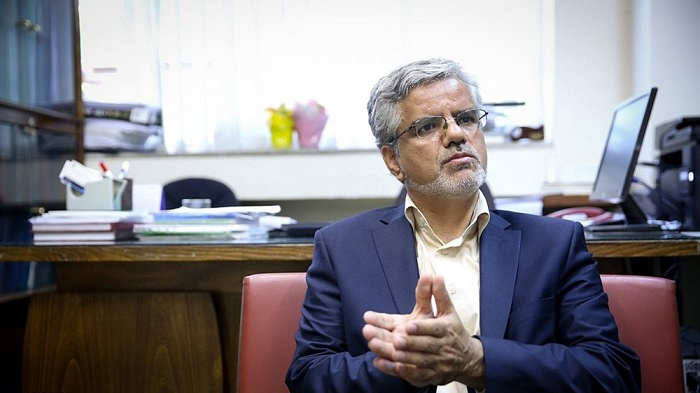How One Reformist Lawmaker Dominated Iran’s Political Spotlight This Week

Mahmoud Sadeghi was entering his apartment in central Amirabad district of Tehran late Sunday night, when officials from the judiciary approached him with an arrest warrant. The 54-year-old MP from Tehran refused to go with them. Instead, he opened his way into his flat, logged into his Twitter account, quoting articles from the constitution which addressed the discretion of parliament members. “According to Article 86 of the Constitution, MPs cannot be arrested or charged for views they have expressed in the Assembly or the votes they have cast in fulfilling their duties” read his first tweet.
Hashtags in support of Mahmoud Sadeghi appeared online as soon as the news spread, with many on Twitter praising Sadeghi’s courage and sense of duty. ‘Sadeghi is not alone’, one popular hashtag read.
Looking back at the course of events in the past few weeks, the Sunday night incident seems to have been predictable. Sadeghi, a Reformist MP who is a cleric without the clothing, had raised the ire of not only Principlists, but also Chief Magistrate Ayatollah Sadegh Larijani during the recent weeks, with his bold remarks. His latest address in Majles, the parliament, in which he asked the head of the judiciary to clarify about his bank accounts, even caused a bitter encounter between Sadegh Larijani, upset about the “absolute insolence” of Sadeghi, and his brother Ali Larijani, the powerful speaker of the parliament. Sadeghi, did not back down, implicitly calling the chief magistrate ‘ignorant’ on his twitter account.
Even before his face-off with the judiciary, Sadeghi was on hardliner media’s radar, called ‘radical’ for his forthright political remarks and accused of seeking fame through controversy. Sadeghi, who chairs the Workgroup for Economic Transparency and Health and Fiscal Discipline, had focused on a number of controversial cases, from illegal scholarships allocated to hundreds of students during Ahmadinejad’s second term, to alleged spending of Ministry of Higher Education’s budget in Saeed Jalili’s 2013 presidential campaign, and the heated wrangle over the so-called ‘astronomical real state’ controversy, i.e. pricey houses sold by Tehran municipality to a number of influential figures, with generous discounts.
The Sunday night face-off between Mahmoud Sadeghi and judiciary prosecutors also stands as a symbol for the battle between Majles and non-elective powers over legislators’ rights and responsibilities. The parliament, already witnessing fewer and fewer of critical voices thanks to ever-restrictive filters set by the Guardian Council, is losing its voice in major national affairs. A little more than a month ago, the Guardian Council entered a struggle with the Tenth Parliament in a bid to extend its supervisory power over MPs, making it able to ban a legislator from completing their term in case they violated a new set of proposed caveats. In April, the Guardian Council had already made an unorthodox decision by barring an MP-elect, the Reformist Minoo Khaleghi from Esfahan, to enter the parliament after pictures of her surfaced online, not wearing the compulsory hijab during an overseas trip.
The day after the judiciary’s effort to detain Sadeghi, MPs showed a significant show of solidarity with him. “All members of the parliament are ordained by the entire nation to express their opinion about national affairs, domestic or foreign, and enjoy exemption from persecution and punishment for those remarks … [Mahmoud Sadeghi’s] remarks are not beyond his discretion” said Parvaneh Mafi, female member of the parliament from Tehran. Ali Motahhari, the most vocal of Majles’ lawyers in the recent years, wrote an open letter to Tehran Prosecutor Abbas Jafari Dowlatabadi, warning that the precedent established by the judiciary, that is, summoning and prosecuting legislators for their remarks, will turn the parliament into “a useless entity”. Minoo Khaleghi, the unfortunate barred MP-elect, also wrote an op-ed in the Reformist Etemad Daily, defending Sadeghi’s right to express his opinion on ongoing affairs. “Supervising the officials’ conduct and their accountability vis-à-vis legal bodies is a key feature of good governance and a law-abiding state” Khaleghi said, quoting articles 84 and 86 of the constitution.
But Principlist media were equally opinionated over Mahmoud Sadeghi’s conduct. Kayhan, the ultraconservative daily, called Tehran MP a “vakil-ol-doleh”, ‘representative of the government’; a pejorative term for describing MPs who act in the best interests of the government instead of their constituency or citizens in general. “While the country is facing many challenges these days, from people’s welfare to youth’s unemployment, from recession to incapability of some officials (which lead to the death of a number of fellow countrymen in a train accident) … controversies created by a member of Majles have dominated the headlines” the newspaper wrote. Gholam-Ali Haddad Adel, former speaker in the 7th parliament, was less considerate than his usual, writing on his Twitter account that Mahmoud Sadeghi’s claim that he had only asked questions from the judiciary, and made no accusations, over bank accounts, was as implicative as asking someone ‘if they were the legitimate child of their father and mother’; an offense in the Iranian culture.
The latest tweet appearing on Mahmoud Sadeghi’s Twitter account is a verse from Iran’s most cherished poet, the 13-the century Hafez. It roughly reads as this: “if the world acts against my will, I will upset the world; I’m not one to be humiliated by the world.” With his disqualification for a second term in Baharestan nearly a certainty, Sadeghi has only got 40 months to realize that.

